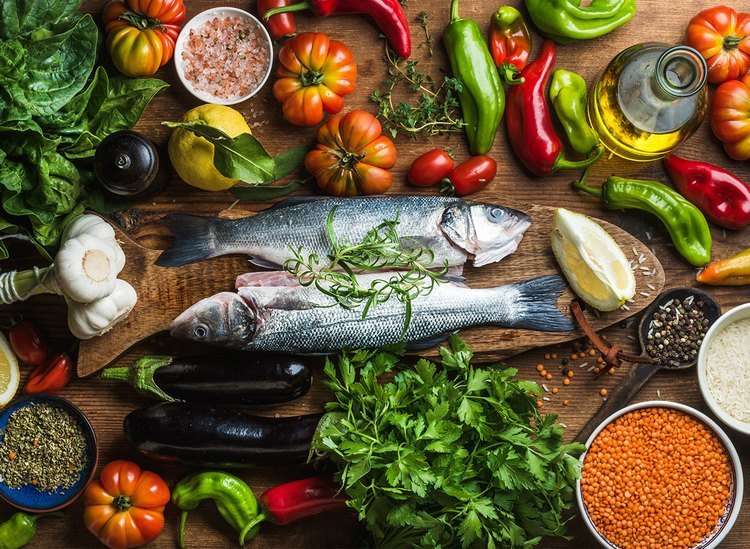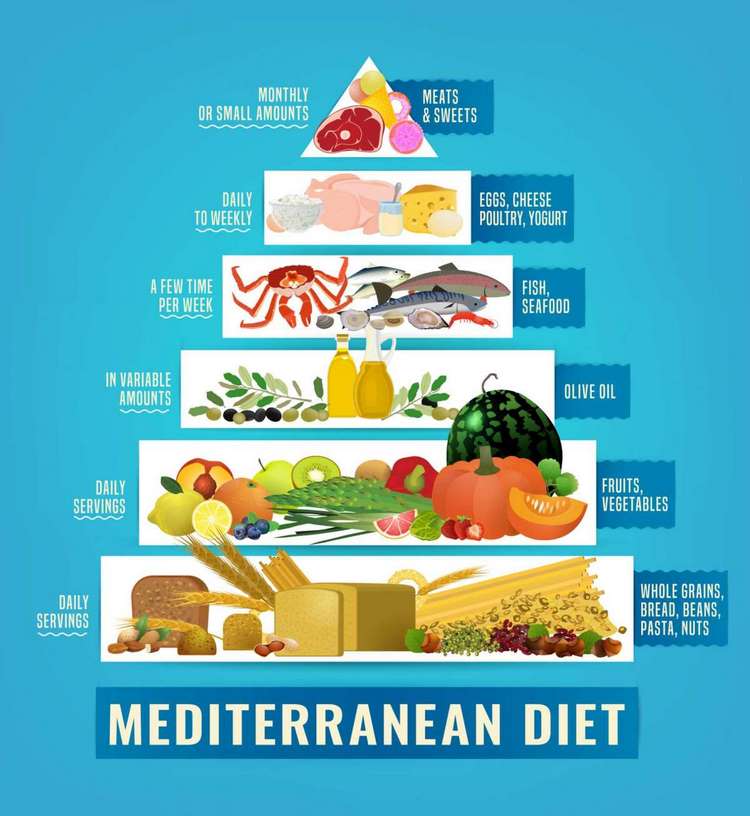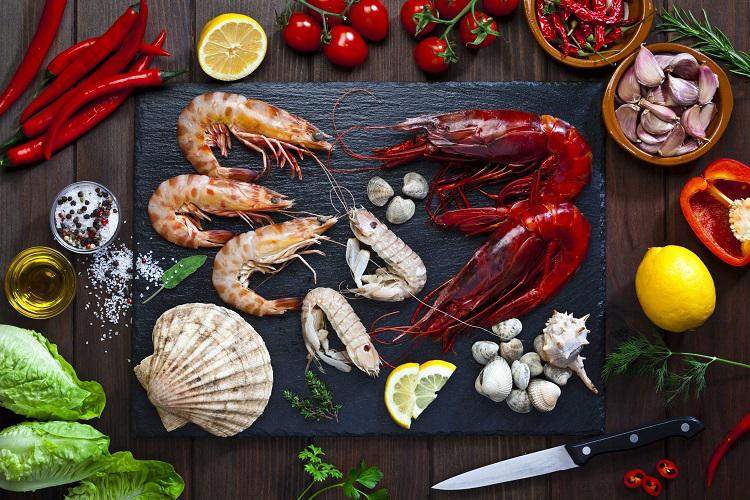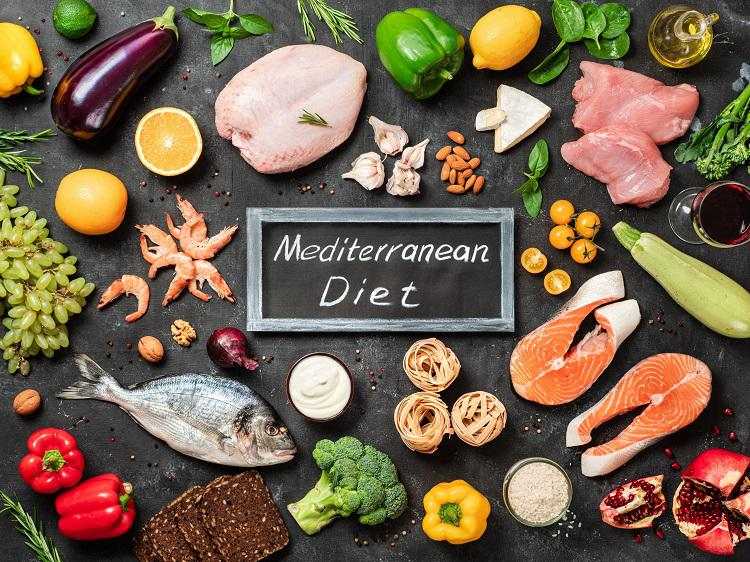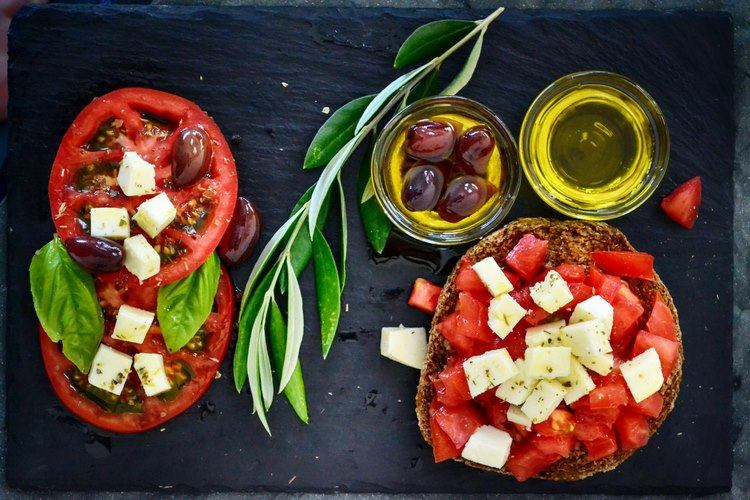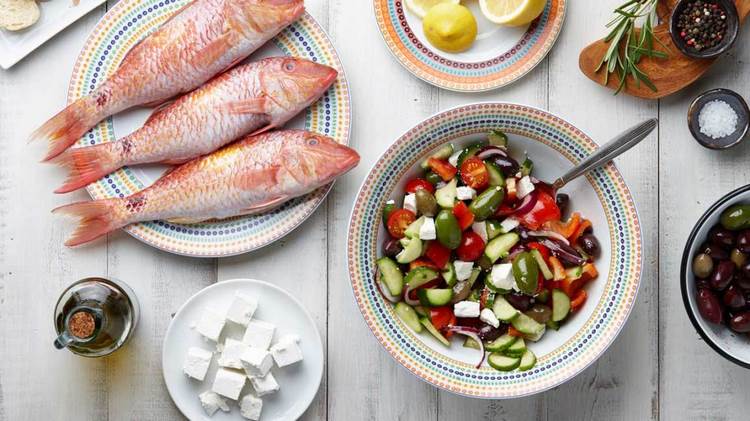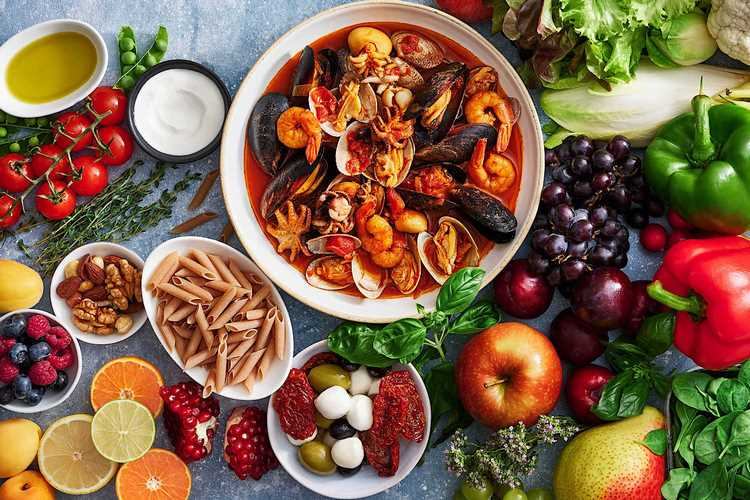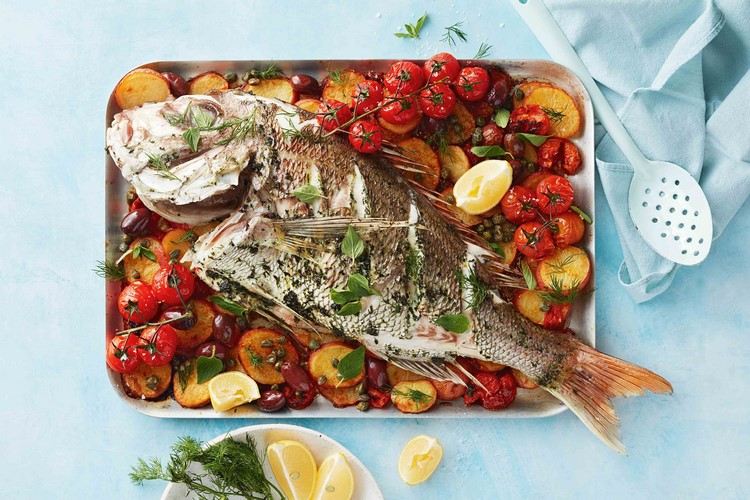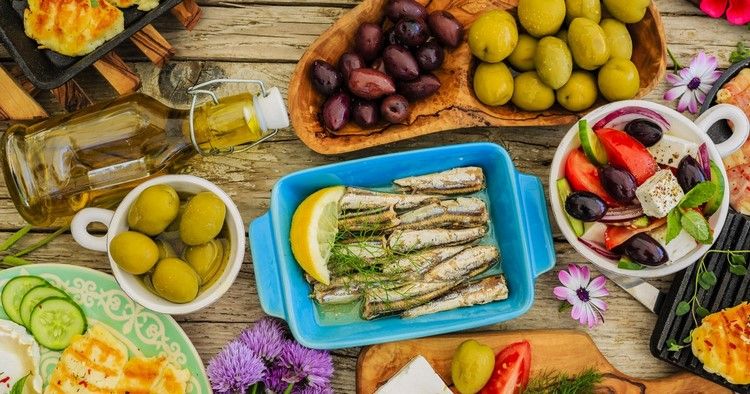How to lose weight effectively? There are many extremely restrictive diets and if we have to be honest, the results are rarely visible. How about a healthy and balanced diet? Actually, the Mediterranean diet is recommended by health specialists around the world, it is rather a lifestyle aimed to improve and maintain our health. What do you need to know about this diet? What are the health benefits, principles, advantages and disadvantages of Mediterranean diet? What types of food should you consume? Let’s have a close and detailed look and give you the answers of all these questions.
What are the basic principles of the Mediterranean diet?
The term “Mediterranean diet” was introduced in the 1950s by Ansel and Margaret Keys. Its distinctive feature is not some kind of scheme or instructions, but the natural eating habits that have formed among the inhabitants of the Mediterranean coast. So, the basis of the Mediterranean diet is consuming fresh products, a large amount of vegetables and fruits (including legumes), seafood, as well as flour from whole grains, nuts, spices, herbs, eggs and yoghurts.
The traditional wine, mainly red, is also not accidental here. Wine has a beneficial effect on health but no more than two glasses a day. Olive oil also plays a special role in this nutritional system. Its acids have antioxidant properties, that is, they prevent the aging process and help food absorption. The nutritional balance is distributed as follows: 60% carbohydrates, 30% fats (mainly olive oil), 10% proteins (beans, peas, chickpeas, meat, fish, poultry.
Mediterranean diet food pyramid is based on foods with a low glycemic index and includes:
- Cereals: brown rice, barley, grits, etc.
- Durum wheat pasta.
- Whole grain or wholemeal bread.
- Legumes: chickpeas, peas, all kinds of beans.
- The next step is fruits and vegetables, which are rich in fiber. It is recommended to eat up to 5 servings a day.
- The next level of the food pyramid includes fermented milk products: cottage cheese, low-fat cheeses, kefir and fermented milk drinks. They supply the body with calcium, fat and protein.
- As desserts, you can eat nuts and dried fruits – 1-2 servings per day. Nuts are rich in fats that will keep your nails and hair healthy. And dried fruits contain pectin and fiber, which contributes to comfortable digestion.
- The daily portion of protein is obtained from fish and seafood and meat like poultry. Eggs are limited to 4 per week. Potatoes are eaten up to 3 times a week.
- Next are the products that are consumed occasionally – 2-3 times a week. These are confectionery, bitter chocolate, honey. Red meat is consumed rarely: beef, pork, lamb, veal – once a week.
Advantages and disadvantages of Mediterranean diet
An important plus of this diet is that there are no negative indications. The menu is balanced, contains all the substances the body needs, and therefore it is not prohibited for people with diseases, pregnant women, lactating women and even adolescents. The only restrictions are in case of allergies and individual food intolerances.
Most of the Mediterranean diet consists of fruits, vegetables, vegetable fats and proteins. Sweets and fatty meats are rarely or not consumed at all. The consumption of low-calorie, healthy food and the elimination of unhealthy foods is beneficial to health and losing weight is a process without hunger and stress.
- Complete, balanced nutrition without restrictions.
- Can be adapted to local cuisine.
- Reduces the risk of cardiovascular disease.
- There are no contraindications for children, the elderly and pregnant women.
- No need to count calories.
- Consumption of fresh food – The emphasis is on seasonal foods prepared in a simple and appetizing way.
- Bread is not forbidden. Choose whole grain bread. It contains more protein and minerals and is generally healthier than bread made with white flower.
- Fat is also allowed. You just need to look for the right type of fat. You’ll find it in nuts, olives, and olive oil.
- The menu is extremely varied – it is more than Greek and Italian cuisine. Search for recipes from Spain, Turkey, Morocco, and other countries.
- Abundance of spices -Bay leaves, cilantro, rosemary, garlic, pepper and cinnamon add so much flavor to the dishes.
- Easy-to-cook recipes.
- You can consume wine – a glass of red wine a day with the meal is common in many Mediterranean countries where tasting delicious food has become a ritual.
- Your heart will thank you – almost everything about this diet is good for your heart. Olive oil and nuts lower “bad” cholesterol. Fruits, vegetables and legumes keep the arteries clear. Fish lowers triglycerides and blood pressure.
- You will get back in shape.
The main disadvantage of the Mediterranean diet is that losing weight is a slow process. Its main goal is to get used to healthy food and improve health. Excess weight will go away very slowly. Gradually, your weight will return to normal, you just need to be patient.
Some products can be expensive but you should keep in mind that they can be replaced with local and seasonal ones – they are cheaper and healthier.
Get to know Mediterranean cuisine
The basis of the diet is Mediterranean cuisine, which includes dishes from different countries. It is not considered a separate national cuisine, but a collection of food principles. The difference in the cuisine of the 16 Mediterranean countries is a result from cultural, ethnic, social and religious characteristics. Each country, of course, has its own “zest”, signature products and unique specialties. Despite the local differences, the principles are the same.
Greek cuisine has become the basis of the Mediterranean diet. The main thing is the use of olive oil, honey and a lot of raw fruits and vegetables, the famous feta cheese and of course the legendary Greek salad.
Italian cuisine has had a huge impact on the Mediterranean. Pastas in various shapes and sizes, seasonal products and cheese are the base on which this food system rests.
Spanish cuisine is a mosaic of culinary traditions in its 17 colorful regions. Spanish cuisine differs from the classic Mediterranean – in Spain they eat more meat than fish and ham is considered the national dish. The cold tomato soup native to Spain – Gazpacho – is also iconic for the Mediterranean diet.
The Portuguese consume large amounts of fish and seafood and eat vegetables with each meal. They use almonds, coconut and cinnamon to create healthy sweets and desserts.
Moroccan cuisine organically combines the traditions of African and Arab cuisines. The signature dishes are stewed lamb, chicken with almond dressing and flatbread.
What are the health benefits of Mediterranean diet?
The Mediterranean diet has become popular around the world for its health benefits. The inhabitants of the Mediterranean Sea live longer than in other countries, they are less likely to suffer from cancer and heart diseases. The secret lies in the quality of the products. Limiting the consumption of refined breads, processed foods and red meat and encouraging the consumption of red wine instead of hard alcohol can prevent cardiovascular disorders.
Also, the inhabitants of the Mediterranean are less likely to suffer from excess weight, high blood pressure, Alzheimer’s disease. This is due to the high amount of fresh vegetables, fruits and a moderate amount of dry red wine in the diet.
Reduced risk of Alzheimer’s disease
A number of studies show that a diet based on seafood, vegetables, fruits, olive oil and red wine improves blood pressure, can lower bad cholesterol levels and stabilize blood sugar levels, which in turn protects you from Alzheimer’s disease or dementia.
Reduced risk of Parkinson’s disease
The high levels of antioxidants in the Mediterranean diet can prevent cells from going through a damaging process called oxidative stress, thereby halving the risk of getting Parkinson’s disease.
Protection against type 2 diabetes
Foods high in fiber are slowly digested, prevent high levels of blood sugar, and can help you maintain a healthy weight.
Weight loss
The Mediterranean diet is good for those who want to lose weight. Again, we have to repeat, that this process is slower so it may take more time, but this can be a great benefit in addition to the improved health.
How to start the Mediterranean diet?
The Mediterranean diet is a balanced, healthy diet. It doesn’t ban any food groups, which makes it easier to follow than diets that eliminate multiple foods or food groups. According to nutritionists, it has no contraindications and does not harm health. So we come to the question – what to eat and what to avoid?
- Eat lots of fruits and vegetables of all colors.
- Try a simple plate of sliced tomatoes drizzled with olive oil and crumbled feta cheese, or have your pizza topped with peppers and mushrooms instead of sausage and pepperoni. Salads, soups and vegetable platters are also great options. Include tomatoes, broccoli, kale, spinach, onions, cauliflower, carrots, Brussels sprouts, cucumbers, etc. in your daily menu. Consume fresh seasonal fruits – apples, oranges, pears, strawberries, grapes, dates, figs, melons, peaches, etc.
- Whole grains: whole oats, brown rice, rye, barley, corn, buckwheat, whole wheat
- Nuts and seeds – add almonds, walnuts, macadamia nuts, hazelnuts, cashews, sunflower seeds, pumpkin seeds, etc. to salads or to your breakfast. Fruits, whole grains, and other high fiber foods are the right way to start your day.
- Fish and seafood – Eat seafood twice a week. Fish like tuna, salmon, herring, cod, and sardines are high in omega-3 fatty acids while shellfish like mussels, oysters, and clams are beneficial to the brain and heart.
- Poultry: chicken, duck, turkey, etc.
- Eggs: chicken, quail and duck eggs
- Dairy products: cheese, yogurt, etc.
- Legumes: beans, peas, lentils, chickpeas, etc.
- Herbs and spices: garlic, basil, mint, rosemary, sage, nutmeg, cinnamon, pepper, etc.
- Prepare a vegetarian dinner once a week.
- Eat dairy products in moderation, especially those with a high fat content.
- For dessert, eat fresh fruits instead of ice cream, cake or other baked goods. Opt for strawberries, fresh figs, grapes or apples.
- Use healthy fats like extra virgin olive oil, olives, avocados and avocado oil. For example, sauté foods in olive oil instead of butter.
- Eat red meat no more than twice a week.
What type of food do you need to avoid?
- Sugar
- Refined grains: white bread, pasta made from refined wheat, etc.
- Refined oils
- Processed meat
- Highly Processed Foods: Anything labeled “low fat” or “diet” or which appears to have been manufactured in a factory.
What is the key to success of the Mediterranean diet?
The Mediterranean diet is a harmonious and natural diet. In its principles, it coincides with the recommendations of the World Health Organization. It is often recommended for weight loss. The key to the success of the Mediterranean diet is the understanding of its principles. In a strict sense, this is not a traditional diet, but proper nutrition with high-quality and fresh products.
One should reduce daily portions and food intake, gradually moving to a healthier diet, without high-calorie and carbohydrate-rich foods. Studies have shown that the Mediterranean diet can help rejuvenate and heal the body, improve vision and skin, lower blood cholesterol and keep the cardiovascular system in perfect condition.
Here is an example of a weekly menu:
Monday – Breakfast – a boiled egg, bread with cheese and tomato. Lunch: paella and fresh vegetable salad dressed with olive oil. Dinner: tortilla – potato omelet.
Tuesday – Breakfast: oatmeal and an apple. Lunch: seafood and vegetable soup. Dinner: steamed or grilled fish and green salad.
Wednesday – Breakfast: Flatbread, fresh cheese and olives. Lunch: fabada – white beans stewed with sausages and ham. Dinner: stewed vegetables with lentils.
Thursday – Breakfast: Omelet of 2 eggs with tomatoes, olives and herbs. Lunch: Seafood and seaweed salad. Dinner: turkey stew with vegetables.
Friday – Oatmeal or muesli, apple. Lunch: lean fish with potatoes. Dinner: roasted or grilled chicken and salad.
Saturday – Breakfast: fruit with yogurt. Lunch: pasta with seafood and a mix of salads dressed with garlic and olive oil. Dinner: lean meat with olives.
Sunday – Breakfast: milk porridge and cheese sandwich. Lunch: stewed potatoes with vegetables and jamon, tomato and garlic salad. Dinner: Roasted pork and Greek salad.

